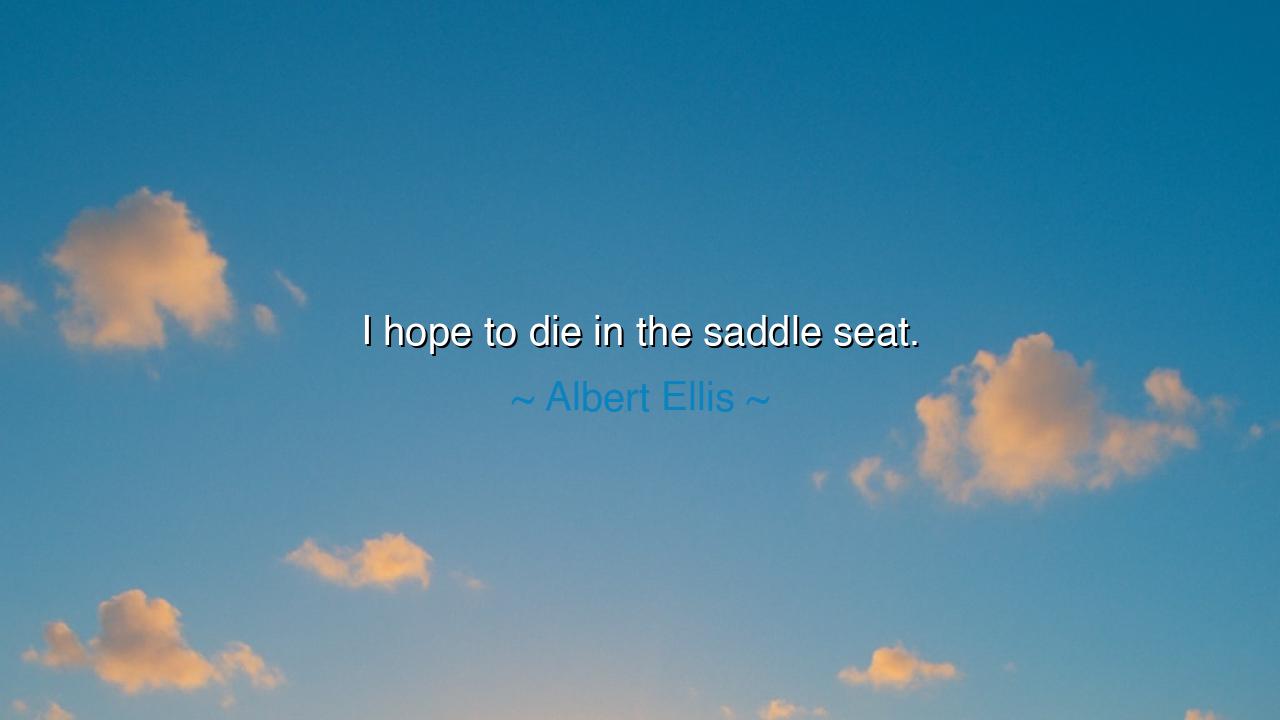
I hope to die in the saddle seat.






The words of Albert Ellis, “I hope to die in the saddle seat,” are not the boast of a warrior nor the lament of an old man; they are the creed of one who understands that life’s purpose is found in unceasing motion. To “die in the saddle” is to refuse the stillness of resignation, to remain engaged in one’s labor and passion until the very final breath. It is the declaration of a soul that rejects idleness, a spirit that finds vitality in purpose, not in comfort. Ellis, the great psychologist who founded Rational Emotive Behavior Therapy, lived and taught the truth that the mind must not surrender to despair or complacency, even when the body begins to falter.
In ancient days, the great riders of the steppes were said to measure a warrior’s worth not by his victories, but by how long he stayed in the saddle. To die in motion, to fall from the horse only when life itself ended, was considered the most honorable death of all. So too, Ellis’s words echo this ancient valor — but he rode not into battle with sword or spear; his battlefield was the human soul, his weapon, the power of reason. His “saddle seat” was his calling, his unending quest to understand and uplift the human mind. To die in the saddle for him meant to work, teach, and serve until his final hour, never abandoning the mission that gave his days meaning.
There is a deep beauty in this defiance against decline. Many grow weary with age, seeking rest as though rest were salvation. Yet Ellis’s spirit, like that of Leonardo da Vinci, remained aflame even as his body dimmed. Leonardo once said, “As a well-spent day brings happy sleep, so a life well used brings happy death.” These words and Ellis’s share a single truth: the nobility of effort. The one who continues to create, to serve, to think, and to love, even when the world suggests he has done enough, lives a life that never truly ends. For such a soul, death is not defeat — it is simply the moment when the body can no longer contain the power of purpose.
Consider the tale of Michelangelo, who, even in his eighties, worked tirelessly upon his sculptures, his hands trembling but unyielding. When his apprentices begged him to rest, he answered, “Ancora imparo” — I am still learning. He too, like Ellis, chose to remain “in the saddle,” guided not by the will to live longer, but by the hunger to live fully. His heart beat for the act of creation itself, and that is what Ellis’s words call us to remember: that life without purpose is mere existence, while work imbued with passion is the very essence of life.
To “die in the saddle seat” also means to live without fear of endings. The ancients understood that death is not the enemy; stagnation is. The warrior who fears death hesitates, but the one who embraces it with purpose rides on courageously. Ellis lived by this principle, dedicating his final years to teaching and speaking, even from his hospital bed. In this, he reminds us that the truest form of youth is not in the skin, but in the spirit’s unwillingness to yield. A man who dies working at what he loves dies immortal in purpose.
This quote is also a challenge to those who live passively, waiting for meaning to find them. It calls forth the discipline of the ancients: to rise each day and mount the saddle of one’s calling, to meet the storms of life with steady hands and unbroken resolve. For those who love their craft — be it teaching, healing, building, or creating — to remain steadfast in it until the end is not a burden, but a form of sacred joy. It is the realization that the journey itself, not the destination, is what ennobles the soul.
So, let this teaching settle deeply in your heart: Do not seek rest before your spirit has finished its song. Work not for applause, but for the quiet satisfaction of fulfilling what you were born to do. Let your days be full of striving and your nights full of gratitude. And when your own final dawn comes, may it find you — as Albert Ellis wished to be found — still in the saddle, your eyes fixed forward, your heart unafraid, and your purpose shining like a flame that refuses to die.






AAdministratorAdministrator
Welcome, honored guests. Please leave a comment, we will respond soon